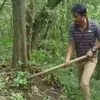Meet the duo who is on a mission to restore India's green cover with 'beej balls'
Founded by Uttkarsh Gangwar and Chitra Chauhan, The Beej Box is is providing people with ready-to-plant beej balls that can help tackle India's depleting forest cover.
India’s forest cover has depleted over the last few years at the cost of developmental and infrastructural projects. But recently, citizen-driven protests and urban outrage in opposition to the felling of trees has increased.
Whether it is the demonstration over the proposed axing of 2,500 trees in Mumbai's Aarey Colony or the residents of Delhi-NCR raising their voice to stop 16,500 trees from being uprooted for redevelopment purposes in June last year, people are speaking up.
According to State of Forests Report 2017, released by policy thinktank Niti Aayog, a meagre 24.4 percent of the country’s land is under forest cover, as against the 33 percent recommended in the National Forest Policy.

A beej ball sprouting into a plant.
The Beej Box, a Mumbai-based social enterprise founded by Uttkarsh Gangwar (27) and Chitra Chauhan (40) in 2018, is on a mission to restore all the green cover that the nation has lost, by providing people with effortless means to plant trees. For this, the company has been offering ready-to-plant Beej Balls.
Made out of fertile soil, natural manure, and coco peat rolled into tiny balls with seeds, all one needs to do for them to sprout into a full-fledged tree is throw them in a place where there is some soil, devoid of stones or concrete. These balls are sold in packs of 10 on The Beej Box website, and the varieties of seeds embedded in them are changed according to the season.

Each beej box consists of 10 balls that can be grown into trees or plants.
Speaking to SocialStory, Uttkarsh Gangwar, Founder, The Beej Box, says,
“Our intent and goal as an enterprise is to encourage individuals to plant as many trees as possible. With all the deforestation and diversion of acres of green spaces over the years, the damage has already been done. However, we thought that it was high time to put in efforts to fix it. And, restocking is definitely a simple yet effective solution for this. In one year, The Beej Box has sold more than 32,000 boxes, which translates to at least 32 lakh trees being planted.”
Genesis of The Beej Box
The founders of The Beej Box, Uttkarsh Gangwar and Chitra Chauhan, met when they were pursuing their MBA at ICFAI Business School, Mumbai. The duo was given beej balls as a token of gratitude for their presence when they both attended an interview on the campus. However, when Uttkarsh and Chitra planted it in an open space nearby, the seeds never germinated. Thus, The Beej Box was born.
“At that juncture, I was very curious to find out as to why the seeds failed to sprout. I did some research and found that most seeds in beej balls are either not tested or not seasonal. This was reducing the success rate of trees growing to as low as 10 percent. So, I and Chitra thought of bootstrapping a venture to produce quality beej balls,” Uttkarsh says.

Uttkarsh Gangwar and Chitra Chauhan, Founders, The Beej Box.
The Beej Box is mainly relying on the corporate and personal gift market in India, considering its overall growth potential. Since online shopping is the new fad, the company has established it as the Point of Sale (PoS).
While Uttkarsh takes care of branding, marketing and quality control, Chitra is at the helm of accounting, management, as well as, operations.
An all in one product
All beej balls made by the firm are packed and sold in a box consisting of 10 pieces each. Each ball has around three seeds mixed and coated with manure, soil, coco peat, mud, and clay. While the clay keeps everything in place and manure aids growth, the presence of three seeds guarantees 100 percent germination.
Every Beej Box contains different varieties of seeds depending on the season. While some boxes are made to encompass seeds of only indoor plants like tomato, chilli, and marigold, others cater specifically to outdoor trees such as gulmohar, papaya, and gooseberry. The box can also be custom made to include both categories of plants.

Each beej ball costs only Rs 10 each.
Each Beej Box is priced at Rs 100 and all the beej balls in them are rolled using hand, by rural and underprivileged women.
“We identify women who are unskilled, enter into a contractual employment, and train them to make beej balls. They are paid Rs 300-350 for a day of work. At any given point, we ensure that there is a ready stock of around 1,000 boxes. The rest are produced on project and need basis. This way, we are being able to provide livelihood and employment to women who otherwise lack opportunities,” Uttkarsh says.

Once the beej ball is thrown in the soil, it starts germinating naturally on its own.
In one year, The Beej Box has provided employment to over 250 women from areas like Mehrul, Jui Nagar and Sanpura in rural Mumbai.
Several business houses like Standard Chartered, HPCL, and Reliance Pipeline Infrastructure Industries have supported The Beej Box by placing regular orders for gifting purposes. The company has designed its box so as to be able to personalise it by adding the name of the company, tagline, and logo.
Making way for green spaces
The detrimental effects of global warming and climate change are already upon us. One of the primary reasons for this is the emittance of greenhouse gases like methane, carbon dioxide and nitrous oxide. However, due to the rapid decline of forests, these gases remain unabsorbed.
The Beej Box is making an endeavour to bring people together and encourage them to plant trees.

The customised beej boxes that were given at Shruti's sister's wedding as gifts.
“Planting a tree sometime gets very tedious. There is a lot of time and effort in terms of digging up the soil, sowing the seeds and then adding the right quality and quantity of manure. In case of beej balls, all people have to do is just throw the ball, add some water, and see it grow naturally. The Beej Box’s goal now is to enable the community to plant at least 10 crore trees by 2020,” Uttkarsh says.
28-year-old S Shruti Ganesh, a freelance photographer, was of the same opinion.
“I had ordered over 350 beej boxes a few months ago to give as a return gift to all the friends and relatives who attended my sister’s wedding. To my surprise, most of them got back to me and said that it was one of the easiest ways to plant trees, and that they derived a great sense of satisfaction after seeing them sprout,” she says.
(Edited by Suman Singh)










